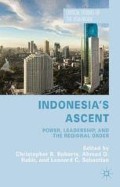Abstract
Why should we view Indonesia as an emerging power? There are a range of indicators supporting Indonesia’s status in international affairs. In the late 1990s analysts referred to Indonesia as a pivotal state.1 The McKinsey Report on Indonesia in 2012 predicted that by 2030, it will become the world’s seventh largest economy.2 In the aftermath of the 2008 global financial crisis, Indonesia even outperformed the BRIC countries, attracting investors searching for new emerging investment markets. A report released on 6 March 2013 by the Boston Consulting Group3 made a case for the archipelagic state of 242 million people as a prime investment destination. Memorable excerpts from the report noted that: 1) Indonesia’s middle income and affluent classes will double by 2020 from 74 million to 141 million people and more than half the population (53 per cent) will qualify as middle class or richer; 2) Indonesians feel more financially secure than people in other BRIC countries (Thirty-one per cent of Indonesians surveyed reported feeling secure, compared with only 14 per cent of Chinese, 19 per cent of Indians, 15 per cent of Russians and 13 per cent of Brazilians); and 3) Indonesia’s middle class will become more dispersed and consequently, new cities will emerge beyond Jakarta as centers of wealth. Here, the total number of cities with more than a million middle-income earners will roughly double, from 12 cities to 22 in seven years (see Chapter 3). A further expectation is that Indonesia will enjoy a demographic dividend during 2020–30 when its productive age group—people between 15 and 64 years of age—maximizes their economic productivity, and dependency ratios are at their lowest levels.4
Access this chapter
Tax calculation will be finalised at checkout
Purchases are for personal use only
Preview
Unable to display preview. Download preview PDF.
Bibliography
Chase, Robert, Hill, Emily and Kennedy, Paul, eds (1999) The Pivotal States: A New Framework for U.S. Policy in the Developing World (New York: W.W. Norton & Company).
Ditchley Foundation (2013) ‘Indonesia-The Other Giant’, http://www.ditchley.co.uk/conferences/past-programme/2010–2019/2013/indonesia
Goh, Evelyn ‘Great Powers and Hierarchical Order in Southeast Asia: Analysing Regional Security Strategies’, International Security, 32, no. 3 (2007/2008): 113–57.
Hurrell, Andrew (2007) ‘One World? Many Worlds? The Place of Regions in the Study of International Society’, International Affairs, 83: 1 (January), 127–46.
—. (2006) ‘Hegemony, Liberalism and Global Order: What Space for Would-Be Great Powers’, International Affairs, 82: 1 (January), 1–19.
‘Indonesia’s Military Flexes Muscle as South China Sea Dispute Looms’, The Jakarta Globe, 13 March 2014.
‘Jalan Perubahan Untuk Indonesia Yang Berdaulat, Mandiri dan Berkepribadian’ [A Way of Change for an Independent, Sovereign, and Strong Indonesia] (2014) May.
Moeldoko (2014) ‘China’s Dismaying New Claims in the South China Sea: Indonesia Will Strengthen Its Military Forces in the Natuna Islands Now That Beijing Wants to Take Them Over’, Wall Street Journal, 25 April.
Oberman Raoul et al. (2014) ‘The Archipelago Economy: Unleashing Indonesia’s Potential’, (McKinsey Global Institute), http://www.mckinsey.com2/insights/asia-pacific/the_archipelago_economy.
Quayle, Linda (2013) ‘Power and Paradox: Indonesia and the “English School” Concept of Great Powers’, International Relations of the Asia-Pacific, 13: 2, 301–30.
Rastogi, Vaishali et al. (2013) Indonesia’s Rising Middle-Class and Affluent Consumers: Asia’s Next Big Opportunity (Boston Consulting Group), March, https://www.bcg-perspectives.com/content/articles/center_consumer_customer_insight_con-sumer_products_indonesias_rising_middle_class_affluent_consumers/?chapter=
Sukma, Rizal (2009) ‘A Post-ASEAN Policy for a Post-G8 World’, Jakarta Post, 5 October.
Tirtosudarmo, Riwanto (2013) ‘The Politics of a “Demographic Bonus”’, Jakarta Post, 24 September.
Vincent, John (1986) Human Rights and International Relations (Cambridge: Cambridge University Press).
Weatherbee, Donald E. (2010) International Relations in Southeast Asia: The Struggle for Regional Autonomy, 2nd ed. (Plymouth: Rowman and Littlefield).
Editor information
Editors and Affiliations
Copyright information
© 2015 Leonard C. Sebastian and Christopher B. Roberts
About this chapter
Cite this chapter
Sebastian, L.C., Roberts, C.B. (2015). ‘Consensual’ Regional Hegemony, Pluralist-Solidarist Visions, and Emerging Power Aspirations. In: Roberts, C.B., Habir, A.D., Sebastian, L.C. (eds) Indonesia’s Ascent. Critical Studies of the Asia Pacific Series. Palgrave Macmillan, London. https://doi.org/10.1057/9781137397416_16
Download citation
DOI: https://doi.org/10.1057/9781137397416_16
Publisher Name: Palgrave Macmillan, London
Print ISBN: 978-1-349-48494-2
Online ISBN: 978-1-137-39741-6
eBook Packages: Palgrave Intern. Relations & Development CollectionPolitical Science and International Studies (R0)

